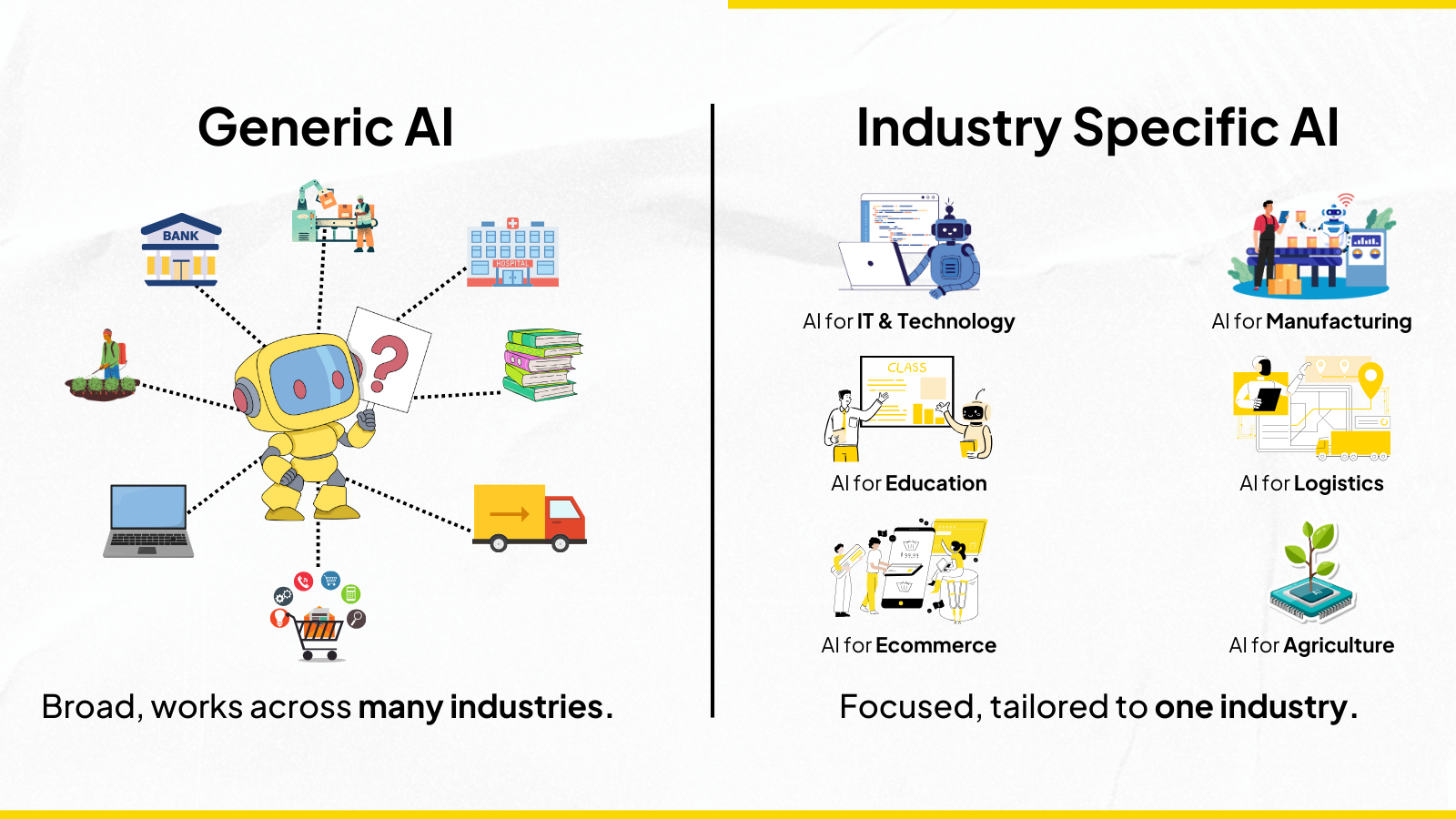Why Industry-Specific AI Outperforms Generic AI: Unlocking the Next Frontier of Business Value
Introduction
Artificial Intelligence (AI) is reshaping industries at an unprecedented pace, fueling innovation and operational transformations. Yet, amid the enthusiasm for AI adoption, a critical distinction often goes overlooked: the fundamental difference between generic AI and industry-specific AI. While off-the-shelf AI solutions offer broad applicability and rapid deployment, their potential is constrained without deep domain expertise. This post dives into why industry-specific AI is the real game-changer—delivering superior accuracy, efficiency, regulatory alignment, and ultimately, sustainable competitive advantage.
Understanding the AI Landscape: Generic vs. Industry-Specific
Generic AI models are powerful all-purpose engines, trained on vast datasets spanning diverse domains. Their versatility allows rapid adoption across industries for various tasks – from content generation and basic customer service automation to image recognition. However, this breadth sacrifices depth: they lack the nuanced understanding of specialized data, industry jargon, and regulatory frameworks critical for precision decision-making in complex environments.
In contrast, industry-specific AI is akin to a master linguist fluent not just in general language but the dialects, idioms, and customs of a particular community. These models are meticulously trained and continuously refined with data, workflows, and compliance knowledge unique to verticals such as healthcare, finance, manufacturing, or retail. The result? AI that not only automates tasks but deeply augments expert human judgment and operational effectiveness.

Why Industry-Specific AI Wins: The Business Imperative
- Precision Through Contextual Intelligence
By incorporating domain-specific knowledge, these AI models drastically reduce errors, misinterpretations, and false positives. For example, healthcare AI tuned with clinical guidelines accurately identifies subtle diagnostic markers missed by generic systems—saving lives and lowering healthcare costs. - Seamless Enterprise Integration
Industry-specific AI solutions are designed to embed within critical enterprise platforms—ERPs, CRMs, supply chain management tools—offering real-time, contextualized insights that elevate operational agility instead of siloed analytics. - Maximized ROI with Focused Problem-Solving
Tailored AI initiatives target high-value pain points—fraud detection in banking, predictive maintenance in manufacturing, or demand forecasting in retail—turning AI spend into tangible ROI faster and scaling impact over time. - Built-In Regulatory Compliance and Ethical Guardrails
Industries like finance, healthcare, and energy face stringent regulations and ethical considerations. Specialized AI embeds these constraints into its core logic, minimizing risks of non-compliance and enhancing trust with stakeholders. - Future-Proofing Through Adaptive Intelligence
Because these models evolve with their industry’s changing data, standards, and market dynamics, they offer sustainable innovation pathways—helping businesses stay ahead amid disruption.
Real-World Impact: Two Compelling Examples
Healthcare Diagnostics Tailored for Complexity
Generic AI may struggle with rare or complex conditions, but healthcare-specific AI trained on clinical data and medical research delivers superior diagnostic accuracy. This leads to earlier interventions, fewer misdiagnoses, and personalized treatments—ultimately improving patient outcomes and driving cost efficiencies
Generic AI may struggle with rare or complex conditions, but healthcare-specific AI trained on clinical data and medical research delivers superior diagnostic accuracy. This leads to earlier interventions, fewer misdiagnoses, and personalized treatments—ultimately improving patient outcomes and driving cost efficiencies
Supply Chain Resilience in Volatile Markets
Generic demand forecasts ignore the intricacies of supplier risks, geopolitical factors, and seasonal trends. Industry-specific AI incorporates these variables to optimize inventory levels, refine routing logistics, and anticipate disruptions—enhancing delivery reliability while reducing operational costs and capital tied up in stock.
Generic demand forecasts ignore the intricacies of supplier risks, geopolitical factors, and seasonal trends. Industry-specific AI incorporates these variables to optimize inventory levels, refine routing logistics, and anticipate disruptions—enhancing delivery reliability while reducing operational costs and capital tied up in stock.
Closing Thoughts: Why Businesses Must Reimagine AI Strategies
The era of “one-size-fits-all” AI is nearing its end. Forward-thinking organizations recognize that industry-specific AI is no longer optional but essential for sustained growth, innovation, and resilience. By investing in tailored AI capabilities, companies unlock efficiencies, foster continuous innovation, and better navigate evolving market demands.
In a world where AI’s transformative power compounds daily, domain expertise emerges as the pivotal key—turning AI investments from mere tools into strategic business assets.
Curious how AI tailored to your industry’s unique challenges can unlock new value? Let’s explore bespoke AI and ML solutions built to drive real impact. Reach out to NAKS for a consultation.